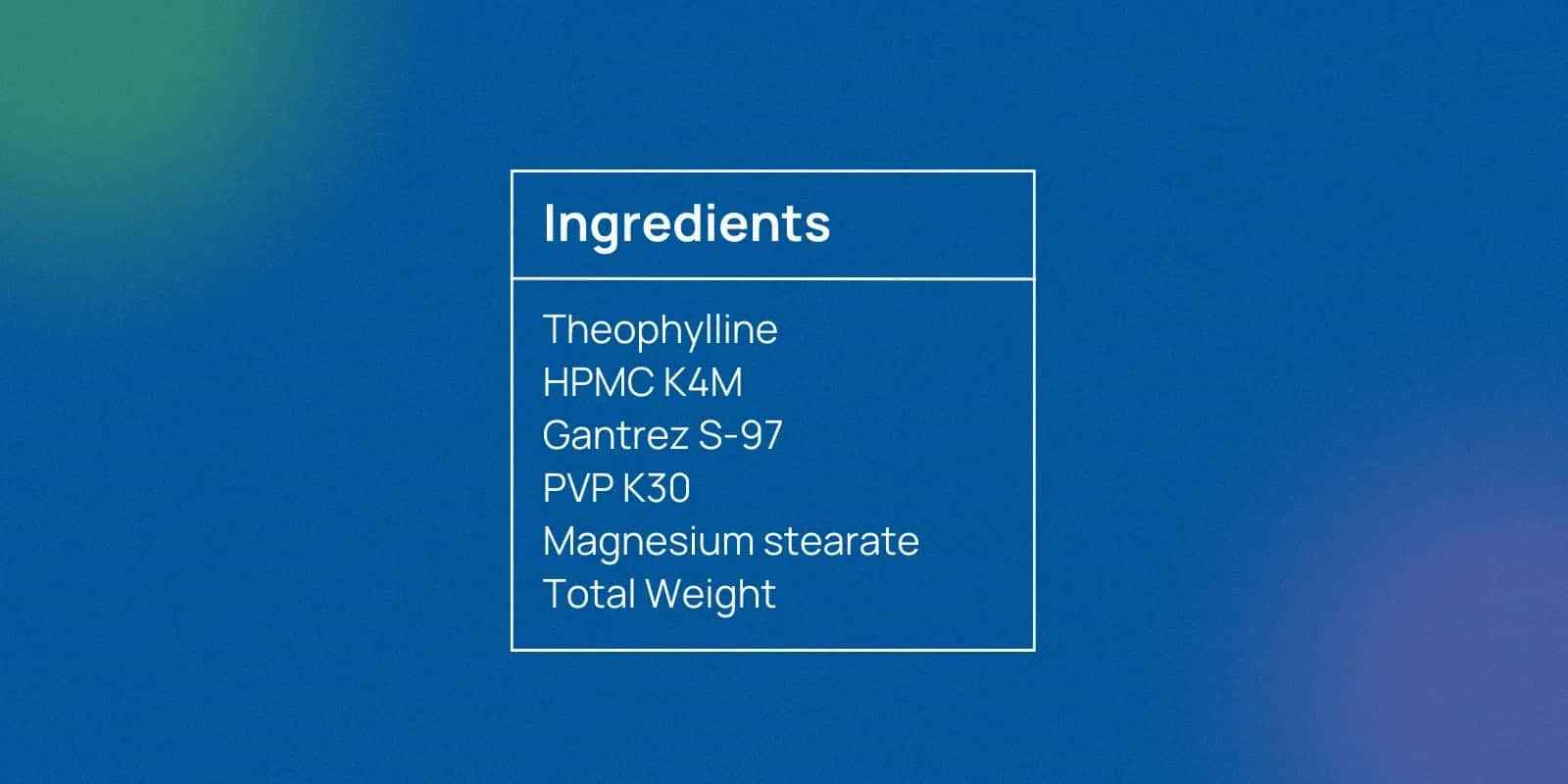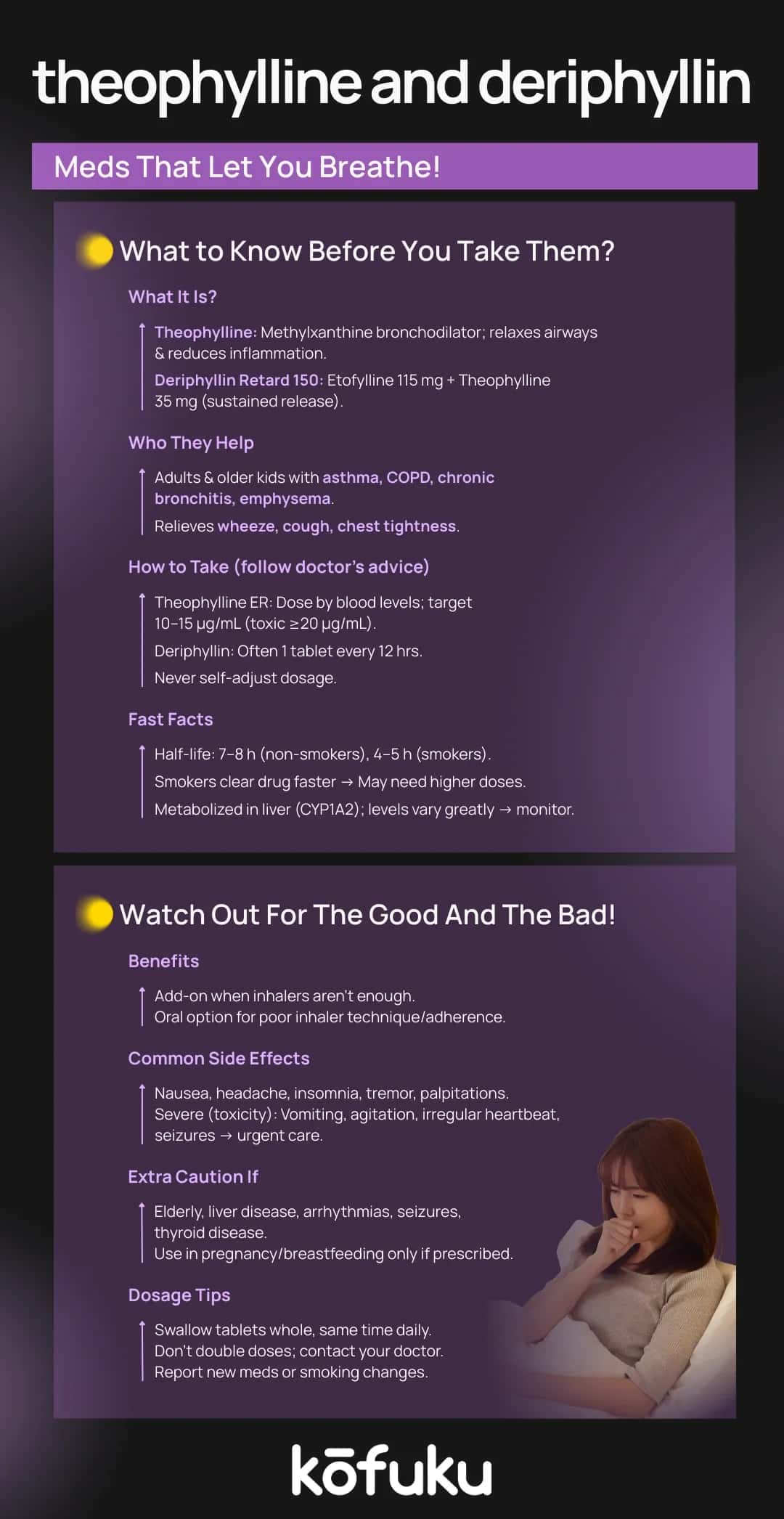Home
Blogs
Contagion
Complete Guide to Theophylline Tablets and Deriphyllin: Dosage, Uses, and Side Effects
Complete Guide to Theophylline Tablets and Deriphyllin: Dosage, Uses, and Side Effects

Introduction
Respiratory illnesses or conditions are increasing throughout India. Data shows that at least 100 million people in India suffer from chronic respiratory diseases. These illnesses can affect your breathing, which can affect your quality of life, which is why understanding respiratory problems is crucial.
Some medications that help treat or manage these conditions are Theophylline and Deriphyllin. Understanding these medications can be complex, but for those managing conditions like asthma and chronic obstructive pulmonary disease (COPD), they're essential.
This complete guide will walk you through everything you need to know about two key medications: Theophylline tablets and Deriphyllin. We'll explore the specific uses of etofylline and theophylline tablets, their recommended dosages, and potential side effects, empowering you to understand your treatment plan better.
What is Theophylline? Tablet Forms, Mechanism, and Key Uses
Theophylline is a long-established, popular, and reliable medicine that helps people with breathing difficulties. It belongs to a group of medications called bronchodilators, which relax the muscles surrounding the airways, allowing you to breathe easier.
You can think of your airways like little tubes, so when they contract or swell, it becomes difficult to breathe. Theophylline keeps those tubes open by relaxing the muscles surrounding the airways and decreasing your lungs' reactivity to things that trigger breathing issues like dust, smoke, or exercise.
Theophylline comes in tablet, capsule, and injection formulations. It's most commonly used for long-term management of airway inflammation and not for immediate relief during a sudden attack (you would have to use something like an inhaler or injection in that scenario).
Etophylline and Theophylline Tablets: How They Work Together
Sometimes, the doctor can prescribe you etofylline and theophylline tablets together, commonly under various brand names like Deriphyllin. Here’s what to know about these:
- Etofylline works by improving the blood flow and oxygenation to the lungs.
- Theophylline relaxes the airway muscles directly.
For some patients, using both tablets together can give better symptom control, including for patients who have difficult symptoms that do not respond to other medications or treatments.

Common Medical Uses: Deriphyllin, Etofylline, and Theophylline Tablets
Your doctor may prescribe these medications for numerous conditions. Here are some instances when these are prescribed:
-
It can be given to patients with asthma to stabilise airways and reduce reliance on inhalers and exacerbations.
-
Chronic Obstructive Pulmonary Disease (COPD). This includes chronic bronchitis and emphysema.
-
Bronchospasm - a condition that involves the sudden tightening of the airways, making it hard to breathe.
-
Pulmonary hypertension or other heart-lung conditions, especially in selected cases.
Main Indications: Asthma, COPD, Bronchospasm, and More
If you have asthma or COPD, your airways are generally inflamed or constricted. Deriphyllin or Theophylline can make everyday activities like walking, speaking, or simply sleeping easier by reducing the frequency and severity of breathing difficulties. They work best when used with other medications, such as inhaled corticosteroids or long-acting inhalers.
Understanding Deriphyllin Tablet Dosage for Adults
The Deriphyllin tablet dosage for adults depends on the following:
- Your body weight
- Your age
- Smoking habits
- Status of liver and heart function
For adults, the typical starting dose is 150–300 mg twice a day, after meals (to help reduce gastric irritation). However, don’t take any medications without consulting your doctor first.
Theophylline tablets are taken in similar dosages (twice a day). In some cases, your doctor might ask you to get a blood test done. This may be to determine the level of the drug in your blood and to ensure the dose is safe and effective.
Children’s and Elderly Dosage Guide: Adjustments and Precautions
Individuals require different doses, especially when they belong to different age groups. This is because their bodies react differently. Here’s how the dosage varies for children and elders:
- Children require a smaller, weight-based dose and careful monitoring.
- Elderly people may have a slower metabolism and may often use much smaller doses to avoid potential side effects.
Never adjust the dose on your own; consult a doctor. If you miss a dose, take the medicine as soon as you remember (unless it is almost time for your next dose). If that is the case, skip the missed dose, and do not double up on it.
Injectable Deriphyllin: How and When is it Used?
Injectable Deriphyllin is used during emergencies like severe asthma attacks, when the tablets take too long to be of any help. The injection dose of Deriphyllin is carefully calculated and given under hospital care supervision, usually administered into a vein (IV) or a muscle (IM).
By its nature, it can cause side effects if administered too fast or in too high a dose. Therefore, it should always be administered under the supervision of trained medical personnel only.

Side Effects of Deriphyllin, Etofylline, and Theophylline
Medications generally have minor side effects, which you may or may not experience. Understanding these will help you know when to seek medical attention.
Common Consequences
- Nausea or vomiting
- Upset stomach or discomfort
- Headache
- Restlessness or difficulty sleeping
Severe Consequences: Call for Medical Help Right Away
- Fast or irregular heartbeat
- Severe dizziness or passing out
- Seizures
- Severe allergic reaction (rash, swelling, trouble breathing)
These side effects cannot be avoided if the level of Theophylline becomes too high in your blood. That's why it is crucial to monitor the levels.
Safe Usage: Precautions, Interactions, and Monitoring When Taking Theophylline
Tell your doctor if you take:
- Antibiotics (erythromycin, ciprofloxacin)
- Anti-seizure medications (phenytoin, carbamazepine)
- Heart medications (verapamil, propranolol)
- Caffeine from coffee, tea, and energy drinks can worsen the side effects.
Also, tell your doctor if you smoke, as it accelerates the rate at which Theophylline clears from your body.
Lifestyle Advice for Better Effect
To maximise the effectiveness of these medicines, follow these easy tips:
- Take your tablets at the same time each day.
- Drink enough water to help your body metabolise the medicine.
- Try not to consume high amounts of caffeine.
- Keep a daily diary of your symptoms to share with your doctor, showing how you’re doing.
When to call the doctor
Call your doctor right away if you:
- Think your breathing is getting worse even after treatment.
- Develop chest pain, a fast heartbeat, or severe dizziness.
- Get a high fever after taking this medicine.
- Start having unexplained nausea, vomiting, or confusion.
Medicines like etofylline and theophylline can make managing and treating certain respiratory conditions easier. But practising safety and caution is crucial to ensure your health doesn’t worsen. So, tell your doctor about existing conditions, medications, and symptoms to ensure you get the right treatment.

FAQs
Q. What are the main uses of etofylline and theophylline tablets?
A. They are used mainly for the treatment of asthma, COPD, chronic bronchitis, and bronchospasm to reduce airway inflammation and improve breathing.
Q. How do I take deriphyllin tablets, and what is the adult dosage?
A. Usually 150-300 mg twice a day after meals, but your doctor will write the dose based on your needs.
Q. What are the side effects of deriphyllin, and when are they serious?
A. Mild side effects include nausea and headache; serious side effects, such as seizures or irregular heartbeat, need immediate medical care.
Q. Can theophylline tablets be taken with other medicines?
A. Only if your doctor recommends it, as some medications may dangerously increase or decrease theophylline levels.
Q. What is injection deriphyllin, and when should it be used?
A. Injectable Deriphyllin is used during emergencies like severe asthma attacks, when a person needs immediate help.

Impact of Contagion on Healthcare Systems and Policies

Cervical Cancer - Importance of Screening and Vaccinations

Right Arm or Left Arm? How Does the Efficacy of Vaccines Depend on Which Arm It Was Injected In?

Why Anti-Rabies Vaccination is Important, Whether It’s a Dog Bite or Scratch

The History, Impact, and Importance of Vaccines Worldwide


